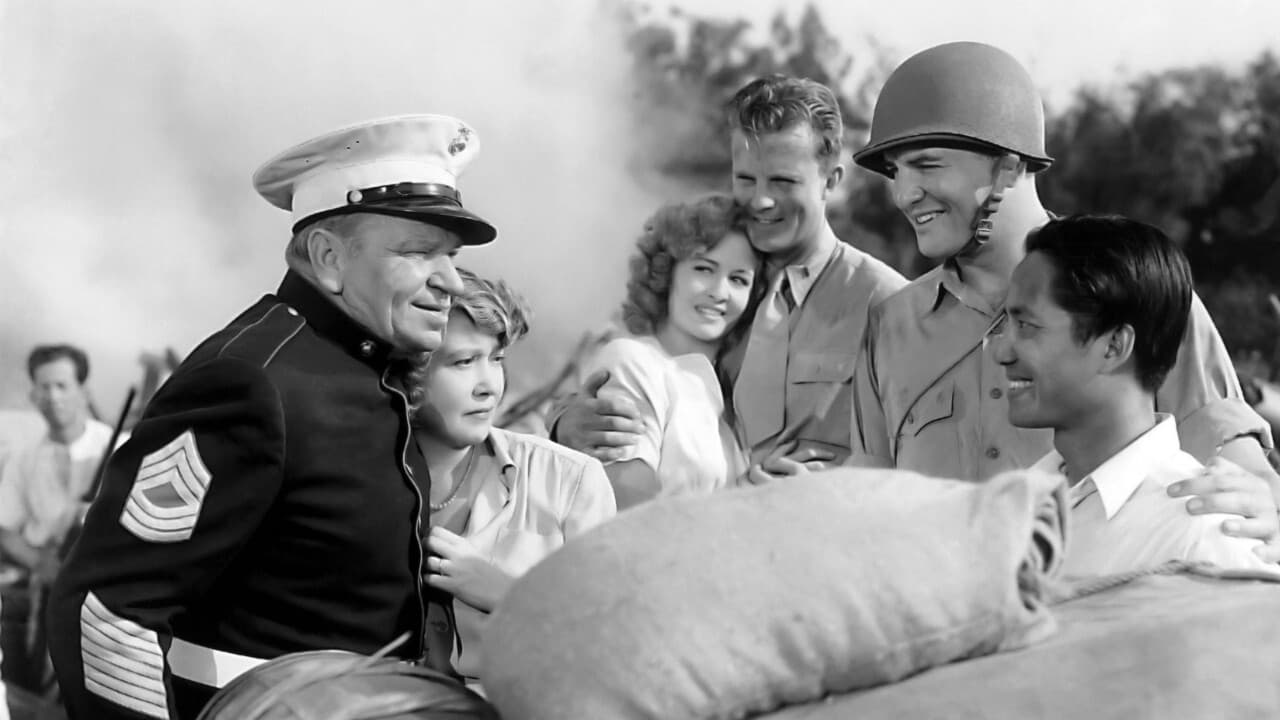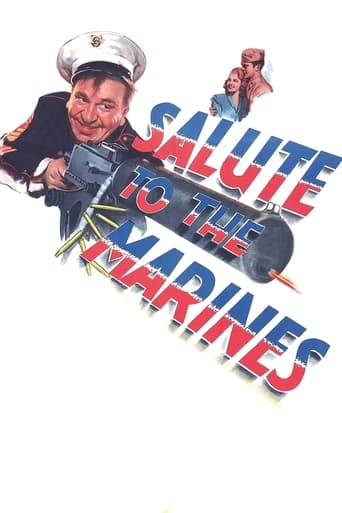

i know i wasted 90 mins of my life.
... View MoreAm I Missing Something?
... View MoreThe film was still a fun one that will make you laugh and have you leaving the theater feeling like you just stole something valuable and got away with it.
... View MoreIt's a mild crowd pleaser for people who are exhausted by blockbusters.
... View MoreWell, I am a fan of the Marine Corps. True, I spent my four-year military career in the Coast Guard but it was just as rugged as the Marine Corps. It was very nice to be served breakfast in bed by the attractive, blond, seventeen-year-old Swedish maids but there must be no expression in Swedish for "medium rare" because they kept fouling up the steak and eggs. But I taught the Marines at Camp Lejeune for several years and they were among the best of students. When they're sharp, they're really sharp. It's also the only service in which the officers' dress uniforms were less gaudy than the enlisted man's.With that prologue out of the way I can now go on to say that Wallace Beery is no marine. My God, is he sloppy. His whole presence is one pile of flab upon another. He was fine as the comically sly Long John Silver but as a by-the-book top sergeant, he's plain incredible. It's almost painful, watching him rearrange the manifold dimples and gyri of his face into one or another expression.The movie, told mostly in flashback, begins in 1941 in the Philippines. Beery's job, as it must be in all such movies, is to bear down on his men and kick them into shape, the Filipino troops included, before he retires. That impending retirement is an event he dreads because he has never won any "battle decorations." He gets his chance. He retires at the proper time but just as he's finding out that inactivity doesn't suit him the Japanese invade the Philippine Islands pari passu. The "bandy legged Nips" and "monkeys" conquer town after town, forcing all the civilians to flee ahead of them. A determined Beery struggles into his dress blue blouse, mobilizes the American and Filipino troops, and stops the enemy long enough for the women and children to escape across the bridge.They're successful despite the bombs delivered by Japanese airplanes. The Japanese airplanes are dull-colored Vought Vindicators, an obsolete American dive bomber of the period, called disparagingly by pilots the "Vibrator" or "Wind Indicator." The Vindicator also plays itself, when American airplanes rush to the rescue of the beleaguered bridge defenders.Fans of old movies may enjoy it. There are a lot of familiar names in the cast but you won't notice them on the screen. The kids may get a kick out of it. But it's really made for Saturday afternoons when people went to the movies and didn't really care much about what was on the screen. William Manchester -- historian, journalist, and biographer of John F. Kennedy -- claimed that he was seduced into joining the Marines after seeing the snazzy uniforms in "The Shores of Tripoli." One look at Wallace Beery wrestling to get into his tent-sized blouse, and Manchester would have joined the Coast Guard.
... View MoreI enjoy watching war films and have seen countless films from the 30s onward to today. While this is not the best of the best, it is also far from the worst of the worst. An above-average war film.This film is a classic Hollywood War Film made during WWII in order to uplift the nation during its darkest days, sell War Bonds, and generate the much needed support for the United States Armed Forces in a time war! To rate this film based on today's standards is to do a disservice to the film and the period. Sure, this film has all of the clichés of a typical 40s Hollywood film. But, you have to understand that this was a way for many in Hollywood who chose not serve or could not serve for various reasons to assist in the war effort. In addition, it does a very good job as portraying the Marines as the best fighters of the US Military forces, no offense intended to the other branches. The Marines are known for hitting the beaches first and leaving last.Wallace Beery does an excellent job telling the story of the tough drill Sergeant who has passed on his skills and knowledge for thirty years waiting for his chance to see combat. He does his job well but wants what every Marine wants, to put his skills to the test.One rarity in Hollywood is the parts of the Filipinos and Japanese fighters are not being portrayed by White Men.In response to the Star-spangled hogwash review by Fred_Rap, I agree with Wholeben that Mr Rap's comments are out of context and unnecessarily harsh.The film was well made and made good use of scenery. While the "green screen" scenes are obvious, the actors deliver their performances well. The weakest part may be the overly friendly competition for the Helen Bailey's affections.The standout performance and reason to see this film is Wallace Beery's portrayal of a Marine who is a Marine regardless of whether he is in uniform. His speech after the Japanese bombing to Colonel Casper was very powerful. In addition the bar brawl against the Merchant Marines was great fun! Sergeant Major William Bailey will not allow anyone to disrespect his Marine Corps! My favorite scene in the film is the final moments with Beery in his Dress Blues sitting with his wife who has stayed behind to help instead of leaving with the other women and children. While she prayed for peace, when war came she stood by her husband and does what she can to help in his "War"!PS: The Japanese soldiers in this film were also portrayed fairly considering when the film was made. There is even a comment made about how smart their officers are in leading their troops. While the Japanese are portrayed as being "sneaky" in using the fishing fleet to prepare for invasion this is entirely understandable considering that the Attack on Pearl Harbor happened only two years prior to the film's release.
... View MoreFirst one needs to remember this film was made DURING the war. Anti Japanese resentment following Pearl Harbor and things like the Bataan Death March were running high. And make no mistake, this film is pretty heavy on the anti Japanese message.But that is also one of the things that makes it interesting. It is a glimpse into how people at the time were actually thinking. And while the "dirty japs" were portrayed as squinty, murdering savages we must remember that at the time it wasn't a completely unfair criticism.The film is also unique in that it has a light "comedy" aspect to it. Wallace Beery manages something like an Archie Bunker quality. Probably much needed comic relief given that the news from the war was not always uplifting.But the final thing one needs to keep in mind is the purpose of this film and ones like it. It was designed to unify the nation against a common enemy. And that is how wars are won. And if the worst thing that happens is our enemies are portrayed in a negative light, well that is hardly the worst thing that happens during wars.
... View MoreMr. Rap's 2003 review of this movie, its context, and the characterization by Wallace Berry, needs a reply. First, the movie was released in 1943 -- at which time the US was not doing particularly well in the Pacific Theatre. Second, the lead character is a career combat NCO who has never seen combat -- yet his outfit has left for the field leaving him behind. Third, America used the theater as a way of seeing familiar faces (actors/actresses) in roles that many would be unable to fulfill, regardless of patriotism, fervor, or desire. Besides Mr. Rap's comments seemingly being out of context as to what was happening in the film (e.g. drinking and fighting, BUT because he was ashamed at being left behind after 30 years of service), the comments also seem downright petty, juvenile, and mean-spirited ("old," "fat," "pot-bellied" etc.). My assumption is that Mr. Rap has other motivations to examine and overcome, unrelated to the movie, but stimulated by the character of Beery.
... View More